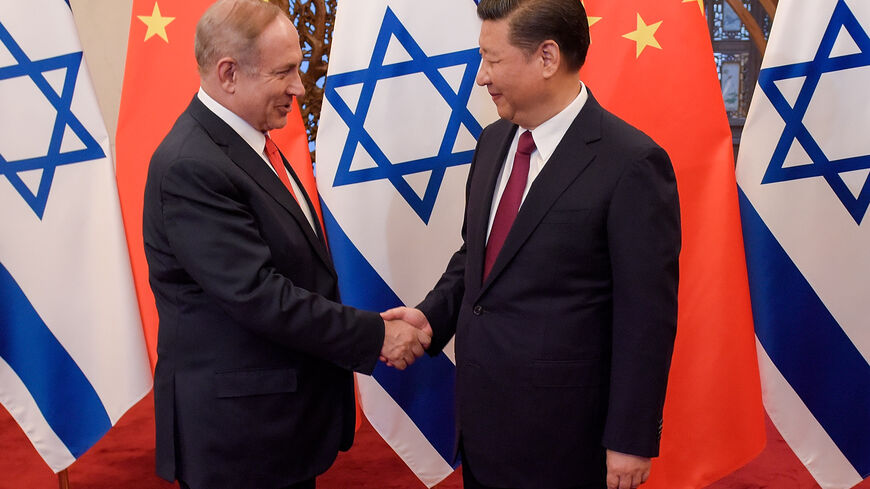Opinions are divided in Israel’s Foreign Ministry over Prime Minister Benjamin Netanyahu’s Tuesday announcement on traveling soon to China, with some diplomats warning that such a trip could harm the country’s relations with the United States.
Meeting in Jerusalem with US congressional delegation members, Netanyahu informed them he has been invited by Chinese authorities to visit Beijing and intends to travel there in the near future. Israeli media reports said the trip could happen as soon as next month, marking the first for the Israeli prime minister since 2017.
Netanyahu, a skilled operator who has navigated ebb and flow relations with successive US presidents, has been snubbed by President Joe Biden and has not received an invitation yet to visit the White House — a rare occurrence for Israeli prime ministers. Lacking such an invitation, Netanyahu banned Defense Minister Yoav Gallant from traveling to Washington, who instead had to travel to Brussels, to meet Secretary of Defense Lloyd Austin on the margins of the NATO ministerial meeting this month. On the other hand, Israeli President Isaac Herzog is expected to travel to the United States at the end of July for a first official visit to meet with Biden and to deliver a speech before the American House of Representatives.
Some of Netanyahu's Cabinet ministers — especially Finance Minister Bezalel Smotrich and National Security Minister Itamar Ben-Gvir — have become persona non grata of sorts in the eyes of the Biden administration, which refuses any contact with them.
But on Tuesday, Netanyahu tried to play down the rift between him and Biden and reassured Congress members about the relationship.
“Netanyahu clarified to the members of Congress that the security and intelligence cooperation between Israel and the US are at their greatest height of all times and emphasized that the US will always be a vital, irreplaceable ally of Israel,” Netanyahu spokesperson Topaz Luk said after the meeting.
The 2023 visit will be Netanyahu's fourth as premier in his 16 years in power. His office said no date has been scheduled yet for the visit, adding that the Biden administration was updated on the Chinese invitation about a month ago.
But some Israeli officials consider Netanyahu’s state visit to China a deliberate and dangerous provocation on his part vis-a-vis the Biden administration.
Zman Israel newspaper quoted an Israeli diplomatic source as saying that among other things, the visit is intended to signal to Washington that Netanyahu also has other diplomatic opportunities to pursue besides the United States.
“Netanyahu is not going to stand and wait for an invitation that is not forthcoming to visit the White House. He is also working in parallel channels. China has stepped up its involvement in the Middle East of late, and the prime minister needs to be there in order to represent Israel’s interests,” said the unnamed source.
Chinese engagement in the Middle East
Indeed, apart from personal pressure, Netanyahu might also be brought into emboldening China’s recent involvement in the region, on several fronts.
Those include Beijing's successful mediation between Iran and Saudi Arabia, which is of great concern for Israel, who is worried that Riyadh will no longer engage in efforts for rapprochement and enlarging the Abraham Accords but rather prefers getting closer to Tehran. In his expected visit to Beijing, Netanyahu might try harnessing Chinese influence to advance the normalization of ties between Israel and Saudi Arabia.
A second front is the recent visit to China by Palestinian President Mahmoud Abbas. During Abbas' visit, the Chinese president presented the Palestinian leader with a new Chinese plan for Israeli-Palestinian peace. In the past few months, China has signaled on more than one occasion its willingness to engage with the Israeli-Palestinian issue.
Getting close to China, good or bad for Israel?
Israel's bilateral relations with China have seen a significant uptick in the last decade. In 2012, bilateral trade amounted to $9.16 billion, while in 2022, it reached $21.8 billion. The rise in bilateral trade included Chinese investments in Israel and involvement in infrastructure projects of transportation, energy and water. For instance, in 2019, the Chinese SIPG company started operating the new part of the Haifa port. Chinese companies are also involved in the Tel Aviv light rail project.
That being said, in 2021, ahead of his visit to Washington, then-Prime Minister Naftali Bennett issued a statement emphasizing that Jerusalem takes very seriously all of the American concerns on Israel’s relations with China. In December 2022, US Ambassador to Israel Tom Nides expressed satisfaction over Israel’s approach, saying the two countries have reached an understanding on Israel’s trade with China and controlling that sensitive technologies do not arrive where they shouldn’t.
Carice Witte is the founder and executive director of SIGNAL, an Israeli policy outfit specializing in China-Middle East affairs. She points out that American administrations of the past decade have been in constant dialogue with the Israeli government over Chinese investments in Israel, especially in sensitive domains such as ports, tech companies and food companies. In the same way, Chinese investments and cooperation with Gulf countries could also complicate things for the Israeli industry sector.
“When China builds smart and secure cities in Saudi Arabia and Egypt, giving itself access to sensitive telecommunication and advanced surveillance technology, it is reason for concern for those countries only. But when China advances tech cooperation with Israel's Abraham Accord partners, such as the Emirates, this could cripple Israeli companies. These companies might be forced to pull out of Emirati tenders,’’ she told Al-Monitor. The reason for that would be restrictions on Israeli security exporters to sell certain advanced technologies to certain states, such as China, or to states that might transfer these technologies to third parties.
Witte estimates that China's interest in Israel is evolving. Still, while Beijing might hope to drive a wedge between Jerusalem and Washington, scoring points in the Middle East arena, Witte does not believe the visit of Netanyahu will seriously impact Israel-US relations. “Since Secretary of State Anthony Blinken had himself visited Beijing lately, the expected visit of Netanyahu could strain to some degree his relations with Washington, but not more than that,’’ she argued.








